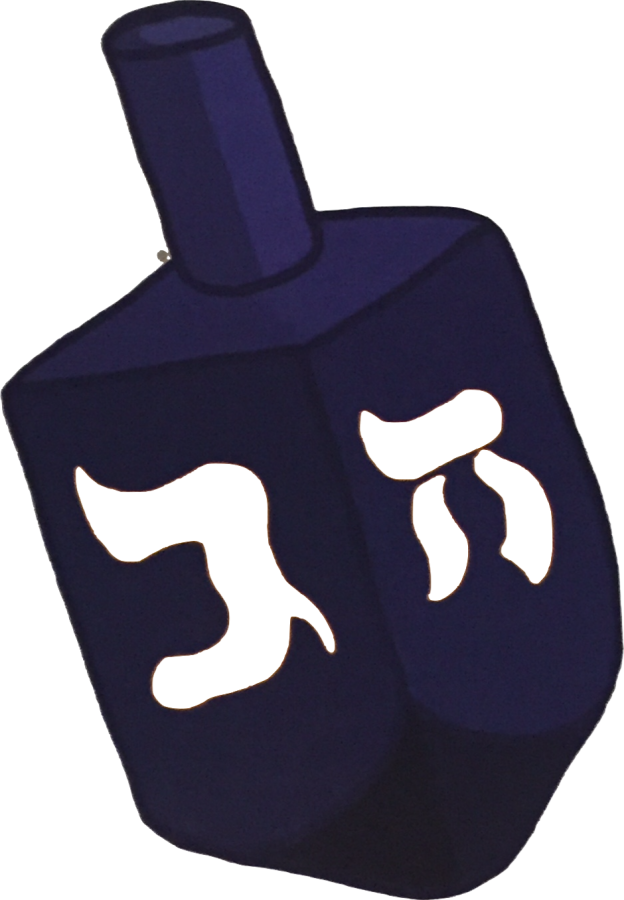After four long months, winter break has finally arrived. Christmas is a few short days away and for the Jews, including myself, Hanukkah has finally fallen during winter break as well. While non-Jews contemplate the various spellings of this well known, eight-day celebration, they often fail to register that this is not the holiest day of the year. Instead, they equate this gift giving holiday with Christmas, and therefore categorize it as the “most important” Jewish holiday. However, this is not the case.
The holiest day of the year for Jews is actually Yom Kippur, which takes place in autumn, following Rosh Hashana. Yom Kippur is not at all a gift giving holiday; it is an intense, holy day of atonement in which we ask God for forgiveness for all the sins we have committed during the past year. During the day we go to temple services, fast, and think about all our wrongdoings while God evaluates them.We do not socialize, watch television, or participate in activities. Most non-Jews fail to acknowledge Yom Kippur’s importance. Once, I even witnessed a Tamalpais parent say to their young child that, Yom Kippur, this so called “holiday” is in fact “made up.” It was thoroughly insulting. Teachers often assign homework due the day after Yom Kippur because they consider it a day off. They believe we can catch up on work when we are in fact not supposed to do anything that distracts us from observing the holiday. This year, my school photo makeup day was scheduled on Yom Kippur. When California Classics, the Tamalpais yearbook photo company, called to remind me of my automatically rescheduled appointment and I told them I was unable to make it due to observing this holiday, they questioned my sincerity.
Yom Kippur is not the only Jewish holiday that has been disrespected and neglected. Basically all Jewish holidays (or holy days) except for Hanukkah continuously go unacknowledged. For example, the Mill Valley Soccer Club announced at a meeting that parents do not need to worry because they schedule most games on Saturdays in order for families to be able to attend church on Sundays. But what about Shabbat, which is observed every Friday and Saturday? Nothing. Individuals also often fail to recognize several other religious holidays such as Diwali, Kwanzaa, Eid al-Adha, or Eid al-Fitr. While I understand that my religion as well as others are minorities in our community, that doesn’t excuse people from showing equal respect and understanding for the observance of all holidays.
Starbucks’s infamous holiday themed cups have been revealed for this year. Unfortunately, these holiday cups should simply be labeled “Christmas cups,” given that they solely display the Christian holiday’s common symbols and themes such as reindeer, ornaments, or Santa in a sleigh. Please understand, I am not disparaging Starbucks for failing to display Hanukkah as a winter holiday on their red cups. Instead, I criticize them for placing importance on one single religious holiday and ignoring all the others.
Starbucks claims that their cups represent world unity; however, a student who asked to remain anonymous because they work at Starbucks believes this is simply a poor excuse to glorify and expand upon the company’s already successful business. “I mean the Starbucks cups are red, white, and green… I think it’s stupid,” The student said. “Make it winter themed, not Christmas themed if you’re preaching for unity.” If Starbucks truly wants a specified holiday cup, they need to either add all of the other religions or clearly relate the cups to the winter season rather than Christmas.
What our community needs to do is either recognize all major religious holidays or not recognize any at all. While elementary schools often speak of and celebrate holidays such as Easter, Saint Patrick’s Day, or Christmas through common decorations and storytelling, other religious holidays are hardly mentioned. The only non-Christian holidays recognized are Hanukkah and occasionally Kwanzaa, due to the fact that they fall close to Christmas. While it is up to the teachers to accommodate to all religious holidays, it is also helpful to the teachers if the student’s advocate for their own religion. If schools plan to acknowledge various religions, the faculty should be teaching religious equality and Christian holidays should not take precedence over other religious holidays in school systems or school calendars. If our goal in Marin County is to promote unity, it is essential that we begin emphasizing religious equality throughout our community.


